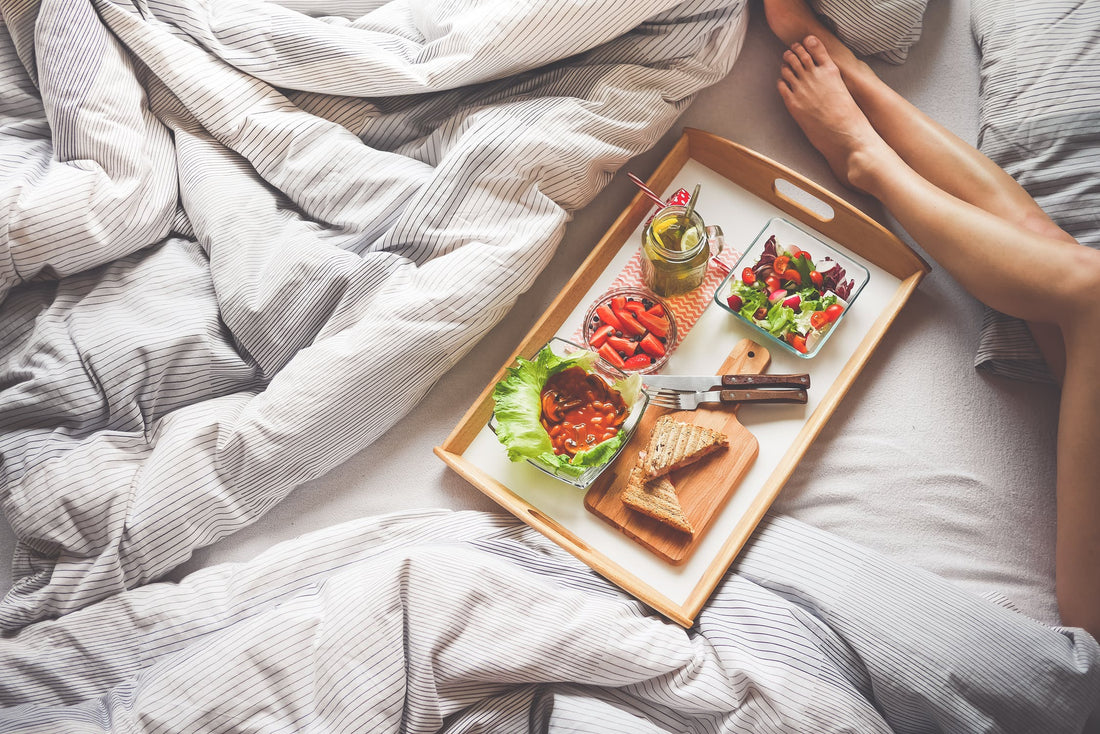
EAT YOUR WAY TO A BETTER NIGHT’S SLEEP
THE RIGHT FOOD AND DRINKS CAN MAKE YOUR NIGHTS A DREAM
What we eat and drink can have a big impact on our sleep quality. Most of us know that drinking coffee in the afternoon/evening can make it more difficult for us to fall asleep but there are many other types of food and drink that either make us sleepy or keep us awake.
Alcohol for example will make us sleepy at first but if we drink too much it can have a really negative impact on our sleep quality. We sleep less and our REM sleep phase is much shorter. As a result we feel sleepier the next day.
So what are the dos and don’ts when it comes to food and drink in order to get the best possible night’s sleep?
SLEEP KILLERS
To ensure we get the best night’s sleep possible we should also give our bodies' metabolism a break during the night.
- Steer clear of foods that are difficult to digest before going to bed including high-fat or protein-rich foods, such as red meat and fried foods. Strong spices can also lead to sleep problems.
- Avoid nicotine, caffeine and alcohol before going to bed, as the stimulating effect can take several hours to wear off.
- Try not to drink too much liquid before bed, so as to avoid disruptive middle-of-the-night trips to the bathroom.
- Don't go to bed either hungry or too full as any discomfort can mean that we can’t sleep. If you feel hungry during the night try to eat a small, light snack.
SNOOZE FOOD AND DRINKS
There are some foods that can help you relax and fall asleep faster as they either contain or promote the release of melatonin, the hormone that regulates our sleep.- Some types of foods contain naturally large amounts of melatonin such as tomatoes, olives, barley, rice, walnuts, milk and cherries.
- Foods containing tryptophan, an essential amino acid that acts as a natural mood regulator and is the precursor to melatonin, has been shown to boost sleep. This can be found in foods such as turkey, wild-caught fish, sesame seeds, cashews and almonds as well as beans and legumes
- Bananas contain not only tryptophan but also lots of magnesium, a muscle and nerve relaxant which can help ensure that you don’t wake up with cramp or muscle pain. Other magnesium-rich foods include sweet potatoes and prunes.
- Medical research has linked eating a Mediterranean diet with better quality sleep and a lower risk of sleeping less as we grow older.
By creating a bedtime routine which includes drinking chamomile or lavender tea you can ease yourself into sleep mode. Bon appetite and good night!
Sources: Mediterranean Diet and Changes in Sleep Duration and Indicators of Sleep Quality in Older Adults. Marcela Z. Campanini, MS Pilar Guallar-Castillón, MD Fernando Rodríguez-Artalejo, MDEsther Lopez-Garcia, PhD. Sleep, Sleepiness, and Alcohol Use. Timothy Roehrs, Ph.D., and Thomas Roth, Ph.D. Disturbed Sleep and Its Relationship to Alcohol Use, Michael D. Stein, MD and Peter D. Friedmann, MD, MPH Dietary factors and fluctuating levels of melatonin, Katri Peuhkuri,* Nora Sihvola, and Riitta Korpela






